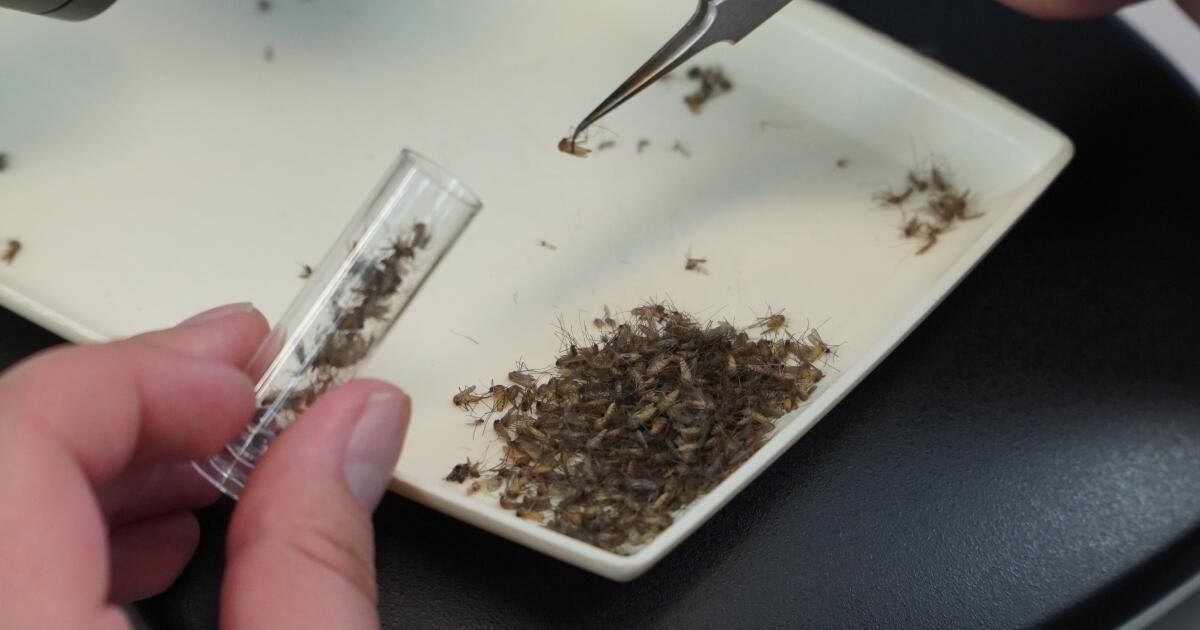Another county in Southern California has confirmed the discovery of mosquitoes carrying the West Nile virus.
They were the first mosquito samples to test positive for the virus this year in Orange County, but according to the state Department of Public Health, 20 of California's 58 counties have experienced West Nile virus activity in 2024.
Orange County has been “pretty lucky this year,” said Brian Brannon of the county’s Mosquito and Vector Control District. The current heat wave aside, he noted that cooler temperatures locally, particularly at night, have meant “we haven’t seen a lot of mosquitoes.”
According According to the agency, the infectious insects were found in Huntington Beach during routine testing in the region. West Nile virus, which can cause symptoms such as headache and fever and in rare cases can be fatal, is transmitted exclusively in Southern California by blood-sucking insects. Culex Mosquitoes that feed at dawn and dusk.
Brannon said there was no reason to panic. The threat to the public remains low in Orange and Los Angeles counties, where no bird deaths related to West Nile virus have been reported. are susceptible to contracting the virus and such deaths would be a clear sign that the disease is spreading.
The state's public health department has counted 88 dead birds that tested positive for the virus so far this year. Santa Clara and Sacramento counties accounted for the majority of the birds. Notably, there have been no human cases in California so far in 2024.
Residents who do not want to be bitten can reduce their risk by removing standing water from their homes (such as uncovered outdoor grills and potted plants with saucers), where mosquitoes breed. Also, choose to wear long-sleeved clothing and apply a repellent containing DEET, oil of lemon eucalyptus or another effective active ingredient.
Other agencies in Southern California are also on alert, monitoring the types of mosquitoes and their population numbers, Brannon said.
In recent years, the invasion Aedes aegypti has grown aggressively in numbers. These bloodsuckers need only a teaspoon of water to reproduce and, unlike the CulexThey have a tendency to bite at all hours of the day. They can also transmit diseases such as yellow fever, dengue fever and Zika.
“This season so far, we’ve only seen West Nile virus,” Brannon said, “but we’re keeping an eye out for any other potential diseases that could spread.”
The Greater Los Angeles County Vector Control District has found three cases of West Nile virus in mosquito samples from the San Fernando Valley, and officials are searching for more as heavy rains this year created conditions ripe for a mosquito invasion.
“Right now, we’re still in the normal season. We haven’t entered any high-risk levels,” said Susanne Kluh, CEO of the Los Angeles County agency. She said it’s normal for these moisture- and heat-loving mosquitoes to be more active in the Valley.
“The virus amplifies more rapidly at higher temperatures,” Kluh said, noting that climate change has been a boon for subtropical mosquitoes and the diseases they carry. Mosquitoes have the ability to adapt to “drier or colder climates,” he added, where “they will continue to spread.”
In the spring, vector control agencies across Southern California tried a new and innovative way to stop the spread of Aedes Mosquitoes can be controlled by releasing more mosquitoes. The strategy, as counterintuitive as it sounds, is exciting, said Tristan Alexander Hallum, director of scientific programs for the San Gabriel Valley Mosquito and Vector Control District.
“We are starting to develop different sterilization techniques to be able to curb those populations,” Hallum said. While it is too early to have data on the efficacy of these efforts, the idea is that sterilizing male mosquitoes with radiation will begin to reduce the number of viable eggs. “Radiation has been a tried and tested method for different programs, such as the screw fly program.”
This summer, Hallum said, fear of contracting West Nile virus or other diseases from mosquitoes should not stop anyone from participating in outdoor recreational activities.
“I would never be afraid of the mosquito-borne pathogens that we see on a consistent basis,” Hallum said. “Right now, we're at a very normal level of West Nile virus in our area.”












